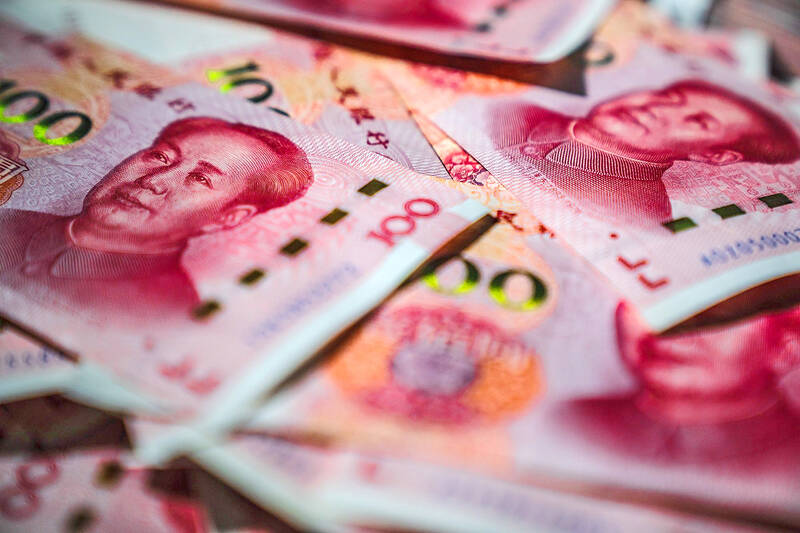Onshore yuan-denominated deposits last month dropped for the sixth consecutive month to 186.047 billion yuan (US$6.12 billion), a 4.69 percent decline from a month earlier and the lowest in nearly nine years, data released by the central bank on Wednesday showed.
The monthly decrease of 9.158 billion yuan from 195.205 billion yuan in December last year also marked the largest decline since local banks began accepting yuan deposits in 2013, an indication that investors have lost interest in the Chinese currency.
Onshore yuan deposits include those at local banks’ domestic banking units (DBUs) and those at offshore banking units (OBUs) in Taiwan.

Photo: Bloomberg
Central bank data showed that yuan deposits at DBUs decreased 5.3 percent from the previous month to 157.693 billion yuan, while those in OBUs fell 1.14 percent to 28.354 billion yuan.
The central bank said the monthly drop of 8.83 billion yuan deposited at DBUs last month came as some companies remitted money to Taiwan and deposited in US dollars after recovering previous investments in yuan-denominated equity bonds or receiving dividend income, the Chinese-language Liberty Times (sister newspaper of the Taipei Times) reported last week.
Additionally, some local manufacturers wired money abroad to repay yuan-based loans or make new investments, which also helped reduce the overall balance of yuan deposits last month, the Liberty Times said.
A decrease of 328 million yuan in OBU deposits from the previous month was due to some companies wiring money abroad for external financing, it added.
The US Federal Reserve’s interest rate hikes have led to US dollar deposits gaining appeal over yuan deposits for institutional and individual investors given the widening interest spreads, the Liberty Times reported, citing the central bank.
Bank SinoPac (永豐銀行) is offering Taiwan’s highest interest rate on one-month yuan time deposits, at 3.15 percent, while Jih Sun International Bank (日盛銀行) provides the highest for three-month yuan time deposits, at 2 percent, central bank data showed.
The highest interest rate for six-month, nine-month and one-year yuan time deposits are 2.28 percent at SinoPac, 1.4 percent at Taiwan Business Bank (臺灣企銀) and 2.2 percent at Sunny Bank (陽信銀行) respectively, the data showed.
Hua Nan Commercial Bank (華南銀行) is offering interest rates above 4 percent for three-month and six-month US dollar time deposits, First Commercial Bank (第一銀行) offers 3.88 percent for one-month US dollar time deposits and Bank of Taiwan’s (臺灣銀行) nine-month to one-year US dollar time deposits pay 4.288 percent, the data showed.

Vincent Wei led fellow Singaporean farmers around an empty Malaysian plot, laying out plans for a greenhouse and rows of leafy vegetables. What he pitched was not just space for crops, but a lifeline for growers struggling to make ends meet in a city-state with high prices and little vacant land. The future agriculture hub is part of a joint special economic zone launched last year by the two neighbors, expected to cost US$123 million and produce 10,000 tonnes of fresh produce annually. It is attracting Singaporean farmers with promises of cheaper land, labor and energy just over the border.

US actor Matthew McConaughey has filed recordings of his image and voice with US patent authorities to protect them from unauthorized usage by artificial intelligence (AI) platforms, a representative said earlier this week. Several video clips and audio recordings were registered by the commercial arm of the Just Keep Livin’ Foundation, a non-profit created by the Oscar-winning actor and his wife, Camila, according to the US Patent and Trademark Office database. Many artists are increasingly concerned about the uncontrolled use of their image via generative AI since the rollout of ChatGPT and other AI-powered tools. Several US states have adopted

A proposed billionaires’ tax in California has ignited a political uproar in Silicon Valley, with tech titans threatening to leave the state while California Governor Gavin Newsom of the Democratic Party maneuvers to defeat a levy that he fears would lead to an exodus of wealth. A technology mecca, California has more billionaires than any other US state — a few hundred, by some estimates. About half its personal income tax revenue, a financial backbone in the nearly US$350 billion budget, comes from the top 1 percent of earners. A large healthcare union is attempting to place a proposal before

KEEPING UP: The acquisition of a cleanroom in Taiwan would enable Micron to increase production in a market where demand continues to outpace supply, a Micron official said Micron Technology Inc has signed a letter of intent to buy a fabrication site in Taiwan from Powerchip Semiconductor Manufacturing Corp (力積電) for US$1.8 billion to expand its production of memory chips. Micron would take control of the P5 site in Miaoli County’s Tongluo Township (銅鑼) and plans to ramp up DRAM production in phases after the transaction closes in the second quarter, the company said in a statement on Saturday. The acquisition includes an existing 12 inch fab cleanroom of 27,871m2 and would further position Micron to address growing global demand for memory solutions, the company said. Micron expects the transaction to